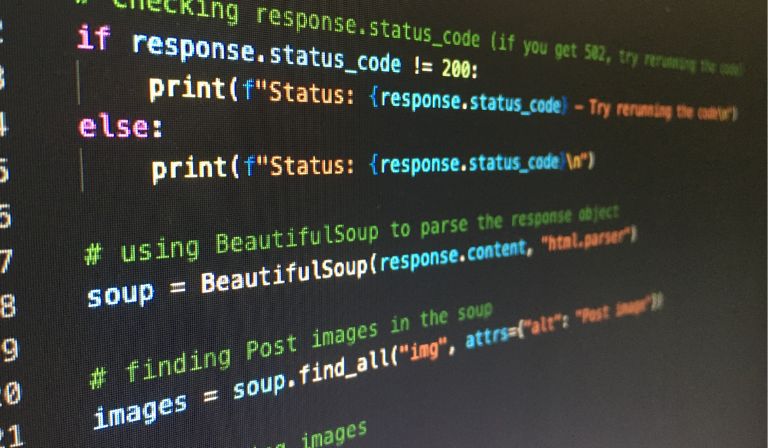Learning Python can be both exciting and challenging. As a beginner, there’s a thrill in writing your first few lines of code, but as assignments grow in complexity, you may find yourself in need of some guidance. In this guide, we’ll dive deep into how to seek help effectively, the resources available, and strategies to maximize your learning.
Table of Contents
ToggleWhy Python?
Python is one of the most popular programming languages due to its readability and versatility. Its syntax is straightforward, making it a great starting point for beginners while still being powerful enough for experts. You’ll see Python being used in web development, data analysis, artificial intelligence, machine learning, and even in fields like finance and biology.
Common Challenges in Python Assignments
No matter how beginner-friendly Python is, everyone encounters roadblocks. Here are some common challenges:
- Syntax Errors – Python’s simplicity is largely due to its strict syntax. Missing a colon or indentation can lead to frustrating errors.
- Logical Errors – Even if your code runs without syntax issues, it may not produce the correct result due to logical flaws.
- Algorithm Complexity – As you tackle more complex tasks, understanding and implementing algorithms can be overwhelming.
- Debugging – Finding the exact point of failure in code takes skill and experience.
- Libraries and Frameworks – Python has an extensive range of libraries, which can be both a blessing and a curse. Knowing which one to use, and how to use it effectively, is crucial.
- Assignment Specifications – Often, assignment instructions are detailed and require careful reading. Students sometimes struggle to fully understand requirements, resulting in incomplete or incorrect solutions.
Step-by-Step Guide to Getting Python Assignment Help
1. Identify the Problem Area
Before seeking help, make sure you clearly identify what you’re struggling with. Is it a particular function, a concept, or perhaps the entire assignment? Breaking down the assignment and pinpointing specific issues will allow you to seek more targeted help and avoid wasting time.
2. Utilize Online Python Documentation
Python’s official documentation is one of the best resources available. Whether you’re looking up specific functions, understanding modules, or diving into advanced topics, the documentation provides comprehensive information. Familiarize yourself with the Python documentation because it will serve as your foundation for mastering the language.
3. Search for Existing Solutions and Examples
Sometimes, seeing how others approached similar problems can be incredibly beneficial. Websites like Stack Overflow are treasure troves of programming advice and solutions. However, avoid directly copying solutions; instead, try to understand the logic behind them. Practicing the code on your own will help reinforce your learning.
4. Reach Out to Programming Communities
The programming community is vibrant and supportive. Here are some places to consider:
- Reddit – Subreddits like r/learnpython are dedicated to helping Python learners. You can ask questions and browse others’ posts for helpful advice.
- GitHub – By exploring repositories, you can see real-world applications of Python. Many developers host code for projects that might be similar to your assignment.
- Discord Servers and Slack Channels – Some programming communities have active chat servers where you can interact in real-time with Python developers of all skill levels.
5. Consult Python Books and eBooks
Books can offer a structured approach to learning. While online articles and tutorials are great for quick answers, books delve deeper into topics. Some recommended titles are:
- Python Crash Course by Eric Matthes
- Automate the Boring Stuff with Python by Al Sweigart
- Python for Data Analysis by Wes McKinney
eBooks and online publications are especially useful if you prefer a portable, quick-reference format.
6. Online Courses and Tutorials
If your assignment involves unfamiliar concepts, taking an online course can provide a thorough grounding. Platforms like Coursera, edX, Udemy, and freeCodeCamp offer courses that cover Python from beginner to advanced levels. These courses include exercises that reinforce learning, so you can apply concepts directly to your assignments.
7. Coding Platforms with Interactive Learning
Platforms such as HackerRank, LeetCode, and CodeSignal are ideal for practicing Python. They feature coding challenges that allow you to work on specific programming problems. Working through these can help you practice skills relevant to your assignments and build problem-solving abilities.
8. Professional Tutors and Assignment Help Services
When you’re stuck and need personalized assistance, you can consider professional tutoring or assignment help services. Many experienced tutors specialize in Python and can walk you through challenging concepts step-by-step. Additionally, assignment help services often have experts who can help with code debugging, explain solutions, or offer guidance on structuring your project.
9. Review Your University or Course Resources
Most university programs provide resources to assist students with assignments. Check if your course offers:
- Office Hours – Professors and TAs often hold regular office hours. This is a great time to ask questions about your assignment and clarify concepts.
- Study Groups – Many students find working in groups beneficial. You can discuss assignment approaches and learn from each other.
- Online Portals – Universities often have online resources or discussion boards for students. Many students overlook these resources, but they can provide valuable information.
Tips for Effective Python Learning and Assignment Completion
Now that you have some resources to get help, here are some tips for applying this knowledge effectively:
- Start Early: The sooner you start, the more time you have to understand each concept and resolve issues. Cramming programming assignments at the last minute can lead to mistakes.
- Write Pseudocode First: Before jumping into writing code, outline your logic with pseudocode. This approach helps you organize your thoughts and create a roadmap for your solution.
- Use a Code Editor with Debugging Features: Code editors like PyCharm, VS Code, and Jupyter Notebooks offer debugging tools. Debugging is an essential skill in programming, and using tools like breakpoints will make it easier to identify and fix errors in your code.
- Comment Your Code: Good comments can help you—and anyone else reviewing your code—understand the purpose of each section. It’s especially useful when you revisit code after a break.
- Experiment and Tinker: Don’t hesitate to experiment. Try out different code structures and see what happens. This approach will help you become more comfortable with Python syntax and logic.
- Regularly Test Your Code: Testing your code as you go will save time when debugging. Implement basic tests to confirm that each part of your program behaves as expected.
- Use Version Control: Tools like Git allow you to keep track of your code changes. This is especially useful if you’re working on a larger project, where you can revert to previous versions of your code if you make a mistake.
Conclusion
Seeking help with Python assignments doesn’t mean you’re weak at programming; in fact, it shows a commitment to improving your skills. With the plethora of resources available today, from online communities to expert tutors, finding the help you need has never been easier. Remember, programming is a journey of constant learning, and every challenge you face will only strengthen your skills. By following the guidance in this article, you’ll be well on your way to not just completing your assignments, but mastering Python as a powerful tool in your skill set.











